To provide value to modern buyers, we need to ask good sales questions and needs analysis questions.

![Free Download: 101 Sales Qualification Questions [Access Now]](https://no-cache.hubspot.com/cta/default/53/e97d6603-b40e-4085-ad55-0074b7351ead.png)
Why? Because today's buyers are complex. They have diverse wants and needs. They're strapped for time. They're hesitant to share information — yet have endless access to product details online.
Whether you're new to sales and looking for a go-to list of sales qualification questions or a manager looking to test new questions with your team, this list of great sales questions to ask customers will help you identify their core needs.
.png)
Free Guide: 101 Sales Qualification Questions
101 Questions to Ask Contacts When Qualifying, Closing, Negotiating, and Upselling.
- Budget Questions
- Business Impact Questions
- Competitor Questions
- And More!
Sales Questions to Ask Customers
Here are the most critical questions salespeople should ask their prospects.
- "Do we need to include any other decision-makers in our conversation?"
- "If timeline or budget were not constraints, what would your ideal solution look like?"
- “Why is this a priority for you now?”
- “What challenges do you think will come up as you try to purchase the product?”
- “Are you currently using another solution? If so, why are you switching?”
- “Has your team tried to use a similar product? If so, how did it go?”
- “How can I make this process as easy as possible?”
- “What’s your approximate budget for this project?”
- “What other tools do you use in your day-to-day?”
- “What challenges have you experienced in the past year related to [product-related goal]?”
When you're speaking with a prospect for the first or second time, it's crucial you ask the right questions. As a salesperson, your job is to discover their core needs quickly and succinctly. The questions above will uncover needs — while also helping you figure out whether this customer is the right fit for your product.
After you get your customer’s answers, you can customize your sales presentations and pitches to their specific circumstances.
Next, we're going to cover needs analysis questions. All of the following questions are open-ended, meaning that they should get the customer talking beyond a simple “yes” or “no.” You can find more open-ended sales questions here.
Needs Analysis Questions
- What is your boss or team hoping to accomplish in the next year?
- What do you perceive as your team’s greatest strength? Weakness?
- From your perspective, what do you perceive your needs to be? How important are they?
- Which resource could you use more of?
- What are your buying criteria and success criteria?
- What do you like best about your current system? What would you like to see changed?
- Would you rather cut costs, save money, or increase productivity?
Needs Analysis Questions About Goals
1. "What are your short-term goals? Long-term goals?"
This open-ended question will give your customer the opportunity to tell you where they want the business to go in the next year. You can begin to figure out how your product will factor into your customer’s goals and position it as a catalyst or accelerator that will help them achieve their objectives.
2. "What is your boss or team hoping to accomplish in the next year?"
Similar to the first one, this question asks about goals, albeit in a different way. By giving them a time frame (one year) and a subject (their boss or team), you can hone in even further on what the business is hoping to achieve.
3. "What are your desired outcomes?"
This question prompts the customer to think not in visions or goals, but in outcomes. Wanting to achieve a far-off or even immediate goal is one thing; having a desired outcome in mind is another.
For instance, if you’re selling HR software to an employment firm, your customer’s goal might be to audit candidates more quickly. Their desired outcome would be to place 30% more candidates at firms that are hiring. You can then describe how your product will help with this outcome.
4. "What deadlines are you currently up against?"
Add more urgency to the conversation by explicitly asking your customer if they’re up against any deadlines. Once you find out if they have a set date where they must achieve or do something, you can highlight your solution as a tool for getting there more quickly.
5. "How do your team’s objectives play into your department's strategy?”
This question might seem extraneous, given that we’ve already covered two questions about objectives and goals. But knowing the role of their team in the department’s larger strategy can hint at the needs of the entire department.
For instance, if you’re selling an SEO software solution, you might want to listen for the team’s role in increasing traffic, meaning that the business is intending to grow its organic acquisition. If your software also offers acquisition tools, you can pitch those as well.
Needs Analysis Questions About Weaknesses
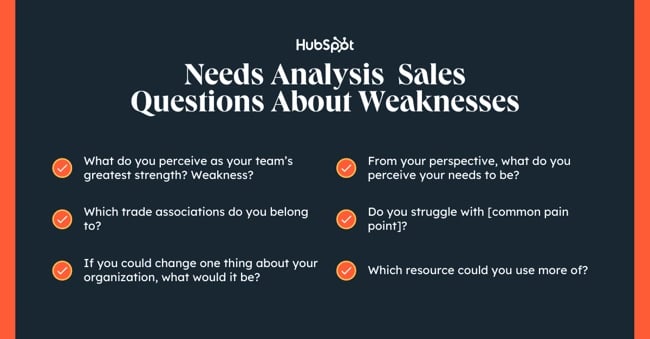
6. "What do you perceive as your team’s greatest strength? Weakness?"
You don’t want to ask what their greatest weakness is first, so start by asking about their greatest strength. After, go after their weaknesses. Knowing their weakness will help you understand what the team could be doing better and how your product fits into potential improvement plans.
7. "Which trade associations do you belong to?"
This question will come in handy if you’re selling marketing software, sales software, or PR services. By asking which trade associations they’ve already joined, you can begin to figure out what your customer is doing to network and get their word out about their business.
If they haven’t joined a trade association, that’s a potential weakness — because that will impede their ability to find more customers using your software.
8. "If you could change one thing about your organization, what would it be?"
This is a great question to keep the conversation flowing, while learning more about the challenges and pitfalls of the organization at large. Even if the answer is unrelated to the product, you can begin to understand some of the organizational challenges and pitfalls your customer deals with.
9. “From your perspective, what do you perceive your needs to be? How important are they?"
A better alternative to “What are your needs?”, this question will specifically ask for your customer’s perception of their needs, not necessarily their actual needs. After asking a series of needs analysis questions, you’ll likely have a better understanding of your customer’s needs than they do. But it’s important to understand what they perceive their needs to be.
.png)
Free Guide: 101 Sales Qualification Questions
101 Questions to Ask Contacts When Qualifying, Closing, Negotiating, and Upselling.
- Budget Questions
- Business Impact Questions
- Competitor Questions
- And More!
10. "Do you struggle with [common pain point]?"
This is a classic question to uncover your customer’s challenges. It works because it puts a name to the pain point. Your customer might not even know what their pain point is until you mention it outright. Sometimes, they might be used to dealing with the challenge and not even bring it up. By posing this question, you force them to reckon with it.
11. "Which resource could you use more of?"
Ask this question to not only understand what resources you could offer right then and there, but to see the types of resources your team could create to convert more prospects. You can send this information straight to your marketing department so you can begin to nurture leads with this new resource.
Your customer might also respond in general terms: They might need a bigger budget or a bigger team. Use this information to further qualify them or figure out if you could create a better package for them.
Needs Analysis Questions About Buying Processes
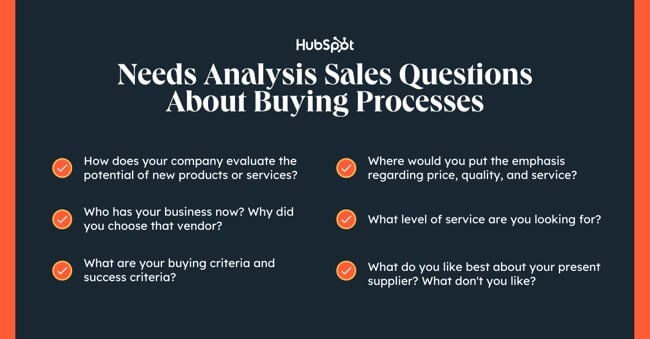
12. "How does your company evaluate the potential of new products or services?"
If you want to sell the product, you need to know how your customer evaluates a product prior to purchasing it. The main benefit of this question is that it’s broad enough that the customer can talk about anything — they’re not being forced to give a certain answer.
13. "Who has your business now? Why did you choose that vendor?"
Your customer might be using another solution — an extremely important piece of information to know. If you find out why, you can also figure out what has won their business in the past and use that to your advantage (or even point out ways that you’re better than your competitor). A good question to follow up with would be, “Why are you switching?”
14. "What are your buying criteria and success criteria?"
This question prompts your customer to describe, in general terms, the key factors for choosing a product. But don’t forget the second part about success criteria. For them, is a success criterion met when they gain more customers? Streamline operations?
15. "Where would you put the emphasis regarding price, quality, and service?"
Use this question to choose whether to upsell your customer or create a discounted package. It can also help you further qualify them if you sell an enterprise product that has a high contract value or if your service team is still growing and developing.
16. "What level of service are you looking for?"
Will they need extensive onboarding? Or do they want a solution that they can simply plug in and start using straightaway? Knowing the level of service and attention they expect will help you gauge their needs once onboarding has started.
17. "What do you like best about your present supplier? What don't you like?"
This question should only be asked after you’ve found out that they’re currently using another solution. By finding out what they like and don’t like, you can begin to understand where your product makes up for their current solution’s pitfalls.
18. "What do you look for in the companies you do business with?"
It’s important to understand what your customer is looking for in more general terms. Is it a long-standing relationship? Or speedy service interactions? Or a dedicated contact whom they can reach out to?
19. "What might cause you to change suppliers?"
Customer churn is a real and unpleasant reality for B2B businesses. You want to find out, from the get-go, what could cause your customer to churn. If they don’t have an answer, try asking, “What caused you to leave a supplier in the past?” Try to go for an anecdotal response.
20. "What do you like best about your current system? What would you like to see changed?"
This question speaks not to the company they’re doing business with, but with the product that that company sells. It’s a valuable question because you get to find out what’s going well and what’s going wrong on a product level.
21. "How do you typically reach purchasing decisions?”
Is it by attending a team-wide meeting, and everyone votes on whether to adopt a solution or not? Does it depend on the contract value of the product? If you’re selling a cheaper product, your customer might have a much more speedy process. But if your product is pricier, they might have a different process.
22. "Would you rather cut costs, save money, or increase productivity?"
This is another way to uncover where your customer’s priorities lie. The fun part is that it offers choices in a “Would you rather” format, making it easier to ask and leading to a more conversational or casual answer.
23. “Which product features would lead to a purchasing decision?”
Some product features might not be necessary to your customers, while others might be critical. Whatever your customer mentions here, use that to highlight that exact feature in your product.
24. “If you’ve considered a similar product in the past but didn’t purchase it, why?”
Has your customer come close to making a similar purchase, but pulled back at the last second? This question will give you insight into potential objections you could face as you near a closed deal.
25. “On average, how long does it take for your team to purchase a product?”
Take advantage of this question to find out how long you could potentially be in conversation with this customer.
.png)
Free Guide: 101 Sales Qualification Questions
101 Questions to Ask Contacts When Qualifying, Closing, Negotiating, and Upselling.
- Budget Questions
- Business Impact Questions
- Competitor Questions
- And More!
Questions to Ask Customers About Your Product
When you're checking in with current clients with the hope of either upselling, cross-selling, or renewing, it's imperative you ask the right questions.
If you fail to ask tough questions about the good and bad of your product/service, you risk missing warning signs they're unhappy and would consider churning to a competitor.
Don't leave the door open. Close it with these questions:
- "On a scale of one to 10, how happy are you with our product?"
- "Why did you give us that score?"
- "Can you explain the weaknesses or challenges you've found in our product/service so far?"
- "What do you love about our product/service?"
- "How likely are you to recommend our product/service to a friend or colleague?"
- "How has adoption and internal use gone in your team?"
- "Do you feel you've received outstanding customer service?"
- "Are you ready to renew today?" (Only if the first seven questions have had positive answers)
- "What can we do to earn your business for another year?"
- "Would you be interested in our new add-on Feature X?"
Questions to Ask Customers to Close the Deal
As you near the end of your conversation with a customer, you want to find out, in no uncertain terms, how you can get their business. Use your customer’s background as a guidepost for how you’ll word this question.
If you get the sense your customer doesn’t like being pushed or is on the fence, try to close in a more circumventive way. Here are some options:
- "What will it take for us to do business?"
- "How soon can we begin?"
- "What is my best shot for winning your account?"
- (If they’re a returning customer) "What did we do in the last sale that impressed you most?"
- "What’s the best time to touch base before you present the product to stakeholders?”
Ask Better Questions to Analyze Your Customer’s Needs
Great sales questions enable you to tailor your messaging to your prospects' goals and show them your solution is the best choice. By asking the right questions, you can further qualify your prospects, close more deals, and increase recurring revenue at your company.
Editor's note: This post was originally published in May 2014 and has been updated for comprehensiveness.
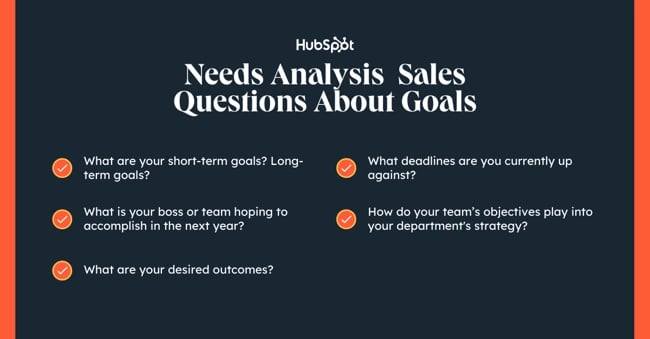
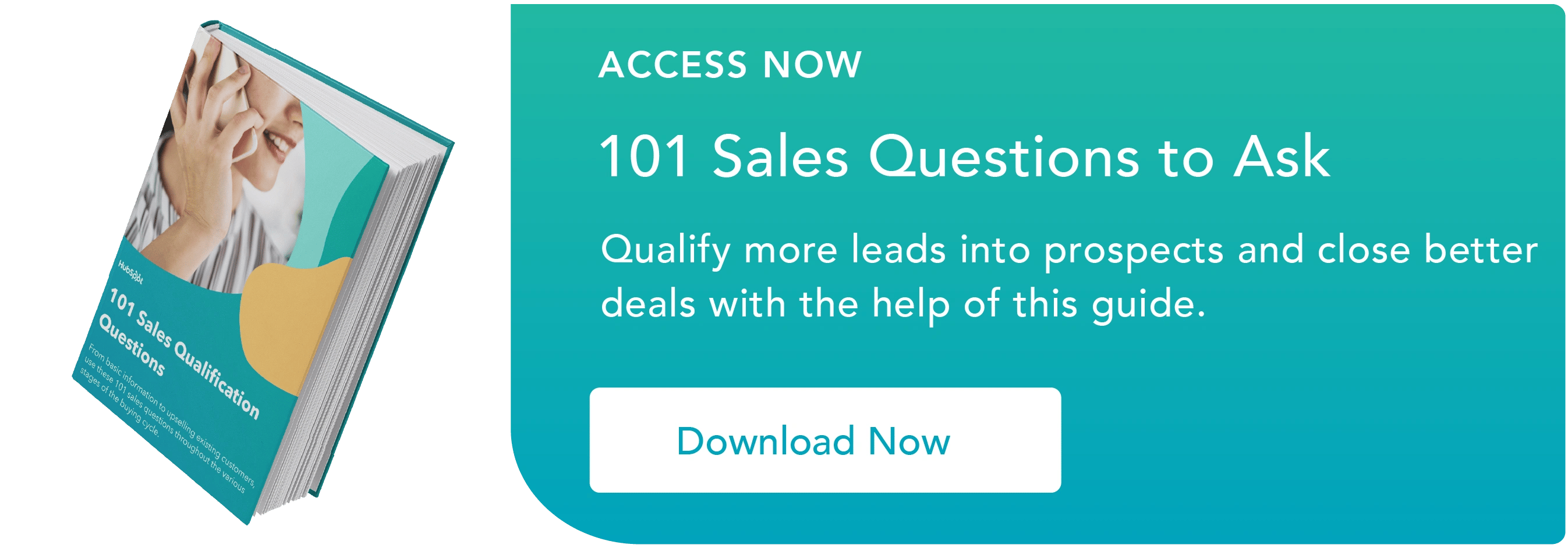
![21 Signs Your Buyer Is a Poor Fit [Sales Process Checklist], According to HubSpot's Former Sales Director](https://blog.hubspot.com/hubfs/Bad fit checklist.jpg)



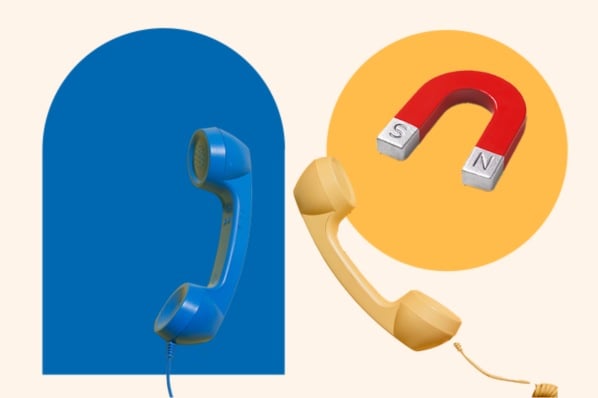


![What a Client Intake Form Is & What It Should Look Like [Template]](https://blog.hubspot.com/hubfs/CLIENT INTAKE FORM (1).jpg)

